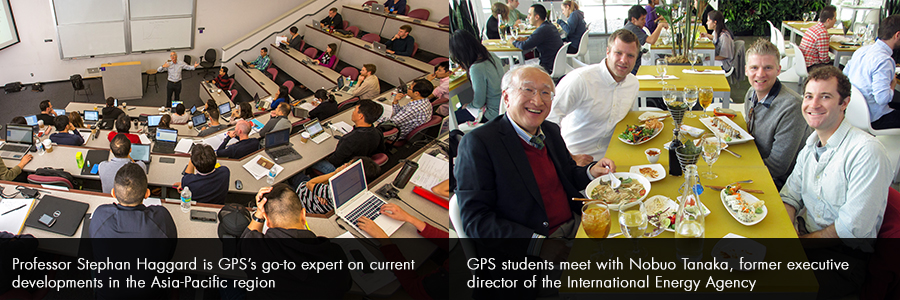
Japan Focus
UC San Diego presents a world-class leading faculty, high quality of teaching and deep involvement in government and business affairs around the Pacific Rim. GPS is proud of its research leadership in economics, political science and international management, as well as a true commitment to teaching rigorous quantitative methods, sound empirical research methods and qualitative analysis skills.
Japan Studies at UC San Diego offers a variety of classes in political science, sociology, literature, communications and economics. At GPS, Japan classes are taught at the masters’ level and include topics such as business and management, the politics of Japan, Japan in East Asia and doing business in the Pacific Rim.
GPS has approximately 40 students in the Japan specialization each year, half of whom are international students (such as from Japan, China, etc.). The most popular career tracks among the Japan Focus students are International Management and International Politics, but Energy, Environment, Economics and Public Policy are also well represented. Visit the UC San Diego course catalog for a complete current offering. Courses that are of interest to the Japan Focus students at GPS include the following:
This course introduces the main aspects of Japanese business and industrial organization, Japanese management practices, and the representation and influence of business interests in the Japanese political economy. Contemporary case studies introduce students to the opportunities and challenges of corporate Japan today.
Overview of postwar politics in Japan, including American Occupation reforms, political institutions, major political factors, mass and elite, and political behavior. Special attention is paid to the issue of Japan’s changing democracy.
This course analyzes how the domestic politics of each country, their international negotiations, and their interaction concerning economic issues have affected the U.S.-Japan relationship. Both the politics of cooperation and integration, and trade friction and conflict are addressed in part through study of specific cases.
Examines the domestic and strategic sources of Japan’s foreign policy in the postwar era. This course emphasizes Japan’s foreign economic policy in regional and global multilateral organizations, and the major security issues it confronts with its Asian neighbors.
This class looks at Japan’s national system of innovation and how it has evolved over time. The digital transformation is opening new opportunities for Japanese companies to become lead players in digital manufacturing, edge computing, robotics and AI, and IoT, the internet of things. Learning goals include analysis of global and domestic markets, innovation ecosystems, corporate analysis and strategy formulation.
Language Program
At GPS, the language program aims to push students to a level where they can discuss in Japanese many of the concepts they are studying in the curriculum. For example, while studying Postwar Politics in Japan, students may practice discussing Japan’s party system or electoral matters in formal Japanese, applying the new vocabulary to current topics.
Students also are trained in professional skills, such as writing business emails and corporate memos, or giving presentations and conducting business meetings—all in Japanese. Even job interviews in Japanese are a part of the curriculum.
The Japanese language program is led by Professor Yasu-Hiko Tohsaku, a specialist in second-language acquisition theory and language pedagogy.
GPS has an intermediate and advanced-level Japanese language program that is connected to class content in the track courses. While beginners can enroll in entry-level courses through the
Japanese Language Studies program, the classes taught at GPS are designed to prepare students for professional-level proficiency in politics, business and economic matters.
GPS Alumni Club
Our alumni go on to hold positions of leadership in government, industry and nonprofits throughout the globe. The GPS Tokyo Alumni Club has more than 150 members The club coordinates special events for alumni and current students, as well as organizes local volunteer opportunities and activities with visiting faculty.
GPS Graduates–Where are they now?
Our Japan Focus boasts one of the largest alumni network at GPS: we currently have approximately 450 alumni around the globe, and of course, the number grows annually. Our Tokyo Alumni Club is one of the largest at our School.
- Asian Development Bank
- Centers for Disease Control and Prevention (CDC)
- International Rescue Committee (IRC)
- United Nations
- U.S. Air Force
- U.S. Army
- U.S. Attorney's Office
- U.S. Department of Commerce
- U.S. Department of State
- U.S. Department of the Treasury
- U.S. Immigrations and Customs Enforcement
- U.S. Navy
- World Bank
- Agency of Natural Resources & Energy
- Bank of Japan
- Consulate General of Japan
- Financial Services Agency
- International Policy Division, Policy Bureau
- Japan Fair Trade Commission
- Japan Self-Defense Forces
- Ministry of Agriculture, Forestry and Fisheries
- Ministry of Economy, Trade and Industry
- Ministry of Foreign Affairs of Japan
- Ministry of Land, Infrastructure, Transport and Tourism
- National Police Agency
- Prime Minister’s Office
- Alibaba
- Amazon/AWS
- Apple
- AT&T
- Bank of America
- Blackrock
- Booz Allen Hamilton
- Cisco Systems Inc.
- Citi/Citigroup
- Dell
- Deloitte Touche Tohmatsu
- Ernst & Young
- Facebook
- Fidelity Investments
- GE
- Goldman Sachs
- HP
- Hitachi America
- Intel
- JP Morgan
- Kyocera
- Levi Strauss & Co.
- Mitsui & Co.
- Mizuho Financial Group
- Morgan Stanley
- MUFG
- Netflix
- Nike
- Nintendo
- Oracle
- Panasonic
- PayPal
- Qualcomm
- Rakuten
- Softbank
- Sony
- The Japan Times
- The Wall Street Journal
- Universal Studios
- …. And many more!
